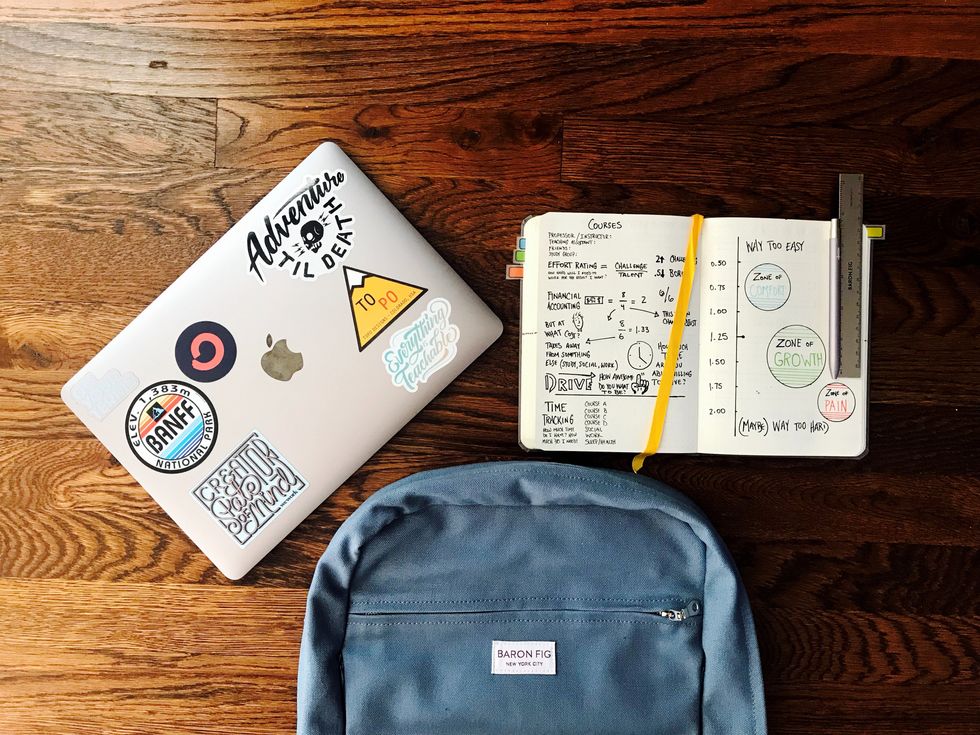With finals fast approaching, I've come to realize that I only have two sides- either I study three weeks ahead or I don't study at all. Instead of stressing about final grades, focus should be on preparing for the large tests looming ahead. These are my study habits and the things I do to help study and prepare for my finals.
1. Create a study plan
This is a very obvious tip but I've found that it helps immensely if you plan out your day ahead of time. Plan when you'll study what subject, and with who if you don't plan to study alone. For example, I have no classes after 3 p.m. on Mondays and Fridays, so I'll plan to study German from 4 – 5, and biology from 6 - 7:30. This way, I have an idea what to study when and I can stay on track to get everything done that I need to.
2. Organize your notes
Nothing irks me more than having all of my notes jumbled together when I'm trying to find a certain piece of information. To combat this, I've developed the habit of organizing my notes in different binders. I've found this particularly helpful in chronological lessons like in history, or classes with a lot of subsections like biology. It also helps to keep different sections of study, such as vocabulary in language classes.
3. Prize tactic
As I have a large sweet tooth, I find that I'll do almost anything to get my hands on something sweet. Including studying. I'm much more motivated to completely my hour and a half of studying if I know I'll be able to eat cookies at the end of the session. Find whatever motivates you and allow yourself to enjoy it after you study. For example, if you enjoy video games, only allow yourself to play after you've completed your previously planned study hours. Or only pull up Netflix when you've gotten everything done that you wanted to do.
4. Study groups
Nothing motivates me more than having other people hold me accountable for my own actions. Therefore, I find a study group to be helpful as I have people around me that expect me to study and help them study, and vice versa. Meeting somewhere quiet like the library also helps eliminate any temptations that could distract me from my studies. You can also incorporate the prize tactic. Maybe plan to go out to dinner or go for ice cream after you've studied for two hours or covered five powerpoints.
5. Memory boosters
It's been scientifically proven that if you chew gum, listen to music, or use specific colors, and then use those during your test, it will help you retain that information. If you write all of your notes in a light blue pen, your brain will correlate that color with the information and you can use that pen on your test to help jog your memory of the information you studied. Same with gum or music, your brain begins to correlate the familiar sensations with the information you're trying to retain.
6. Learn your learning style
It's pretty much common knowledge that everybody has different types of learning styles. Visual learners learn best from charts, graphs, and pictures, auditory learners learn best from lectures and music, and kinetic learners learn best from hands-on experiences. Learning how you learn best can help you study because it allows you to know how to best cater to your brain so you can retain the information easier. You can research different ways to engage your brain while studying and figure out what works best for you.
7. Give yourself breaks
While studying is great and can help you prepare for the all-important final, there is nothing productive about studying when your brain is not absorbing the information. Studying for too long can actually decrease productivity and cause you to be distracted more easily. Pushing yourself too hard for too long will do nothing good, and all-nighters can do more harm than good. Nothing is more important than your own personal health.






 The minimum wage is not a living wage.
StableDiffusion
The minimum wage is not a living wage.
StableDiffusion
 influential nations
StableDiffusion
influential nations
StableDiffusion












